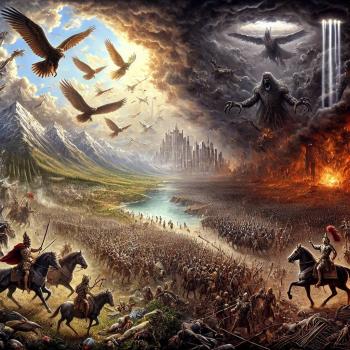During Passion Week, Jesus and his apostles sat down on the Mount Olives overlooking the Temple Mount below. All three synoptists relates this incident, in which Jesus then taught extensively about the future and his second coming. Matthew and Mark relate this episode similarly, but Luke has some reporting that is different from the other two. One Lukan addition concerns “Gentiles” trampling Jerusalem. Or should it read “nations”?
This teaching, called the Olivet Discourse, was prompted when Jesus’ disciples marveled at the beauty of the temple buildings. Indeed, they were recognized as one of the seven wonders of the world. Most consisted of massive stones carved from far-away quarries and laid on top of each other as walls. Josephus, the famed Jewish historian of that time, says many of these stones were forty feet long and ten feet or more high and wide. It must have been quite a feat just to transport them perhaps hundreds of miles.
Jesus then replied to his disciples, “Truly I tell you, not one stone will be left upon another; all will be thrown down” (Matthew 24.2 NRSV). That is exactly what happened, forty years later, when the Roman armies ended the First Jewish Revolt in the summer of 70 A.D. by destroying Jerusalem and killing about a million Jews there. The Temple buildings caught on fire, perhaps accidentally. Since they were adorned with much gold, it melted in the fire and flowed down into the many crevices between those massive stones. The story is that the Roman soldiers then “went for the gold,” using their war machines to pry the stones loose and move them about in order to find the rich metal.
Only Luke adds that Jesus said, “For there will be great distress on the earth and wrath against this people [the Jews]; they will fall by the edge of the sword and be taken away as captives among all nations; and Jerusalem will be trampled on by the Gentiles, until the times of the Gentiles are fulfilled” (Luke 21.23-24). The word in the Greek text which is translated “Gentiles” both times in v. 24 is ethnon. It means “Gentiles” or “nations,” referring to nations other than the nation Israel. But notice that earlier in v. 24, we read “nations” which translates the same Greek word. It surely means “nations,” as it is translated in all English Bibles, rather than “Gentiles.” Indeed, after the Second Jewish Revolt, in 132-135, the Romans forced Jews out of their land to scatter into many nations, called The Diaspora.
I suspect that if Jesus meant “nations” for the first ethnos in Luke 21.24, he probably meant the same for the subsequent two uses of that word in v. 24. Accordingly, that latter portion of the text would read, “Jerusalem will be trampled on by the nations, until the times of the nations are fulfilled.” The common translation, it being Gentiles, is rather vague, leaving the reader to question what the times of the Gentiles could mean. But “times of the nations” could refer to the several prophecies in the book of Daniel about the future of the supremacy of the Gentile nations. Daniel says they will come to a cataclysmic end with the eternal kingdom of God spreading throughout the entire earth.
The apostle Paul has a similar phrase in his book of Romans. He writes, “I want you to understand this mystery; a hardening has come upon part of Israel, until the full number of the Gentiles has come in. And so all Israel will be saved; as it is written, ‘Out of Zion will come the Deliverer; he will banish ungodliness from Jacob.’ ‘And this is my covenant with them, when I take away their sins'” (Romans 11.25-27). Again, the reader questions what “the full number of the Gentiles” means, apparently having no scriptural guide as to its meaning. As above, “Gentiles” translates the word ethnon, which can mean “Gentiles” or “nations.”
With Gentiles as the translation in Romans 11.25, it commonly has been understood to refer to the salvation of Gentiles. Joseph Fitzmyer (Romans, 621-22) informs, “Two interpretations of it are current: ‘until the full number (or strength) of the Gentiles’ has accepted the gospel, as foreseen by God’s foreknowledge, or until the salvation of the Gentiles occurs to its ‘fullest extent.'” Fitzmyer adds, “But when will that full number be reached? Paul does not say.” Actually, the expression “full number” translates to pleroma, which more properly means “the fulness.” That is how to pleroma is always translated in Colossians 1.19, wherein it says “the fullness” of God dwells in Jesus Christ.
If to pleroma and ethnon are translated likewise in Romans 11.25, that is, “the fullness of the nations,” again, the book of Daniel comes to mind with its prophecies about the fulness of the nations occurring at the end of the age, which is what Paul is writing about here. And what is this fullness of the nations that Daniel predicts will occur at that yet future time? It is that ten kings will reign over the world’s final Gentile empire, which some characterize as “a revived Roman Empire.” These ten kings are symbolized by ten toes on the feet of a human image in Daniel 2 and ten horns on an indescribably terrifying and dreadful beast in Daniel 7. A little horn rises up among these ten horns to symbolize the Antichrist of the end times (7.8). He will persecute God’s people like noting before, only to be destroyed by Jesus as his second coming (cf. Daniel 7.13).
Both Jesus and Paul knew the book of Daniel well. I think Jesus got his concept of the kingdom of God mostly from Daniel which Jesus spoke often about in his many parables. Jesus and Paul knew that the end of the age will not come until this fullness of the nations comes into existence. Paul writes elsewhere concerning Jesus’ second coming, “Let no one deceive you in any way; for that day will not come unless the rebellion comes first and the lawless one is revealed, the one destined for destruction” (2 Thessalonians 2.3), referring to the Antichrist. Paul here alludes to Daniel 8.23. It reads in the NIV, “when the rebels have become completely wicked, a stern-faced king, a master of intrigue, will arise . . . he will destroy many and take his stand against the Prince of princes,” referring to Jesus at his second coming.
In conclusion, I think it is more enlightening to translate pleroma and ethnos in the above texts, so that they refer to this arrangement of the nations as the final Gentile empire. Only then can the Antichrist appear at the end of the age to be destroyed by Jesus. He will then establish the eternal kingdom of God on earth. And Israel will reign as chief of the nations, with Jesu’s earthly throne being located at Jerusalem.














